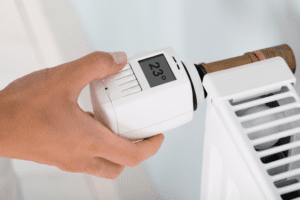Selecting the right heating option can be a challenge, especially when one considers how much of your annual energy spending goes towards just heating and cooling your space. One of the most common and popular options are electric heaters. We aren’t talking about space heaters, though they operate on the same principle, but central heating systems using forced air heated by resistance coils inside the HVAC system, or heat pumps powered by electricity. Are these systems worth your time and money? Should you consider installing one in your home or business? To get to the bottom of that curiosity, let’s explore the key advantages of central heating with electric power.
You Get What You Pay For — Improved Efficiency
 One of the key benefits of using central heating from an electric coil is that there is no loss of energy in the conversion to heat, so it could be said to be 100% efficient. All the power your system pours into the resistance heating coils transforms into heat energy. While this does not necessarily translate into a stronger heating system, it does mean you are not paying for wasted fuel. Even highly efficient natural gas furnaces will not be able to
One of the key benefits of using central heating from an electric coil is that there is no loss of energy in the conversion to heat, so it could be said to be 100% efficient. All the power your system pours into the resistance heating coils transforms into heat energy. While this does not necessarily translate into a stronger heating system, it does mean you are not paying for wasted fuel. Even highly efficient natural gas furnaces will not be able to
One drawback is that while you get what you pay for, what you pay could be more than with other heating technologies. According to the Department of Energy, most electric power comes from large-scale generation plants which only boast efficiencies of about 30%. In other words, heating with electrical power can be more expensive. This area is where electric heat pumps, also called reverse air conditioners, can prove more effective. They use up to 50% less energy than resistance heating and remove heat from the air or ground outside to bring inside, the opposite process from the one your AC uses in the summer.
Excellent Performance in Mild Climates
Whether heat pump or coils, though, one thing is true about both: they perform best in milder winters. When temperatures plummet beyond the freezing point, both types of systems won’t perform at their best. Coils will require more expensive electricity as they operate for more extended periods to warm the building, while heat pump efficiency begins to decline at very cold temperatures.
However, what if you live in an area where it rarely reaches freezing? The high-powered heating of a gas furnace probably isn’t the best option, owing in part to higher maintenance needs. When you only need to run the heat every now and again, a heavy-duty furnace is an overkill. Electric heat pumps can keep your home at a comfortably warm temperature without breaking the bank when the utility bill arrives the following month.
A Safer, Less Maintenance-Intensive System
Electric systems have fewer moving parts, and different mechanisms than other furnaces, and thus have correspondingly lower maintenance requirements. That doesn’t mean they’re maintenance-free; heat pumps can develop refrigerant leaks, and electric coils will ultimately burn out and require replacement. However, compared to gas furnaces, these problems can prove easier to diagnose and less expensive to correct. Changing air filters and a regular maintenance check-up from a trustworthy HVAC contractor is often all you need to keep an electric central heater in good working order.
Electric central heating also has one more advantage over gas and oil systems: they do not produce carbon monoxide (CO). While furnaces shouldn’t leak CO under normal circumstances, damage (such as to the heat exchanger) can cause conditions hazardous to human health. Because electric systems never burn any fuel directly, there is nothing to produce CO in the first place. Thus, they can offer a safer alternative.
When Should You Consider an Alternative to a Central Heating Unit on Electric Power?
For very large spaces or in areas where temperatures plunge and stay very cold for long periods, more traditional gas furnaces will likely prove to be the more cost-effective choice. For commercial purposes, these systems are also better for creating different climate zones. However, electric systems have some definite advantages, and there are many usage scenarios in which they will deliver the hassle-free performance you need at a price point that’s acceptable to your budget.
No matter which option you choose, consult with a knowledgeable HVAC professional before proceeding any further. Not only can the pros help you assess what system is best equipped to heat your home or building, but they can also open the door to safe and reliable installation. Knowing where to turn for regular maintenance or fast repairs in the future is a benefit to you as well. When you’re ready to take the next steps or simply aren’t sure if electric heating is right for you in spite of its advantages, contact trustworthy contractors and gain the valuable insight about central heating through electric means that you require.

